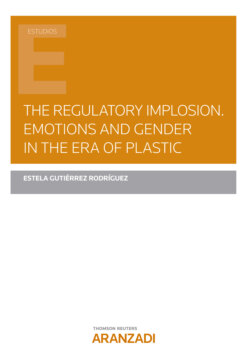Читать книгу The Regulatory Implosion. Emotions and Gender in the Era of plastic - Estela Gutiérrez Rodríguez - Страница 23
На сайте Литреса книга снята с продажи.
7.1. The importance of the globalization effect
ОглавлениеGlobalization has placed us in a new civilization68.
We are living in more dynamic, open, delocalized societies and the regulatory framework is less rigid, with new actors, with innovative legislative mechanisms that respond to an increasingly restless, nomad, and demanding citizenship.
Thus, the so-called “global administrative law” must act ex ante. That is, keeping pace with changing societies, anticipating economic and socio-cultural events in this global framework69; global administrative law, must advance to the movements that society is showing and that reorient the public safety and security of the future.
We have seen it recently in the case of supervening pandemics, and particularly in the case of the well-known covid19 (for its acronym coronavirus 2019), in the absence of preventive regulation, based on the precautionary principle, there is a collateral and uncontrolled global effect of globalization, which can be devastating.
The globalization effect has greatly facilitated the planet’s exposure to all kinds of chemical substances. Globalization modifies the way in which local public administrations interact with their administrered. Citizens that once were in the most common places in towns and cities, such as civic centers, neighborhood and sports, leisure and cultural associations, now prefer to invest their time in traveling digitally through internet or traveling in person, visit places, to live experiences and the richness of experiencing diverse cultures.
The geolocation of public management has changed.
Currently, “transnational life in common means social proximity despite geographical distance”70. Or also: social distance despite geographical proximity. Town councils and public institutions have involuntarily yielded; meeting places, forums to be in contact with citizens, spaces for local coexistence. This change has also meant a loss of public capacity to warn, sovereignty to inform and as a whole to protect local populations.
With globalization, a different concept of locality has been born, in which citizens modify their feeling of belonging as we knew it, and become individual assets crossing any border. The speed of movement of the last pandemic experienced clearly shows us. In a couple of months, the virus had spread worldwide, also coinciding with the Asian lunar year holiday.
The concept of topopolygamy or the globalization of biography, means being tied to several places and belonging to several worlds, the meaning of GloCalization helps us to understand the magnitude of the exposure of citizens to biochemicals such as EDC. If we compare the rapidity of the spread of covid19 with the global presence of EDC, we can understand the omnipresence of endocrine disrupting chemicals.
One of the problems related to the spreading of EDC is the rapidity of opening the markets, the brightness of the private sector, as opposed with the inability of rapid global regulation and far from the local sphere, as defined by the famous sociologist U.Bech; “Life itself is no longer something tied to a place, a settled and sedentary life. It is a life on the road, a nomad life, a life in a car, plane, train or on the phone, on the Internet, a life supported and marked by the media, a transnational life. Living in one place no longer means living with others, and living with others no longer means living in one place (…) you are and you are not”.
Thus, globalization with the rapid opening of markets contrasts with the slow adaptation of administrative law. This continues to be the main cause of transmission of disorders in human health and safety, we see it clearly in the case of the covid 19 pandemic.
If eventully, will be demostrated that the virus broke out from the city of Wuhan (China),due to the consumption of “street food” in a local market, as reported by the media, it would mean once again, the evidence of a lax regulation for the human security. In this case in the food industry.
In Global law no progress has been made to regulate ancestral eating habits in developing countries, and globalization has made them available around the world. If previously, as an example, only one neighborhood ate bat soup sitting on the floor, only a specific group of people could get sick. Globalization has led billions of tourists to eat bat soup on the streets, which is exciting and succulent at the same time, but must be accompanied by regulation to ensure food safety.
It happens in China and it happens in many other countries around the world. The habits in a globalized world must be regulated or when crossing borders, collateral effects are unpredictable.
We see how social movements are questioning the fundamental legal bases of developed countries. Currently the content of the Magna Carta that once represented peace and social articulation is being questioned. Among the reasons is the fact that, they consider that the Constitutions no longer respond to their current needs, and this is partly due to the emerging global environment, in which States, in the inevitable process of transferring sovereignty, are audited by the citizens who are encouraged and represented by the so-called Global Communities.
States as we knew them until now, are becoming obsolete in the face of the concept of “transnational State”, since it is doubted that “belonging to a State” is indispensable. Society indirectly seeks new forms of territorial belonging. People are developing a supranational sentiment and a manifestation of their own nationality.
This is the birth of the “glocal” cosmopolitan citizenship, that shape the Global Communities and whose regulation proposals will contribute to cause a Regulatory Implosion in the Science of Law; essentially their soft law will have an effect and repercussion on hard law administrative regulation.
